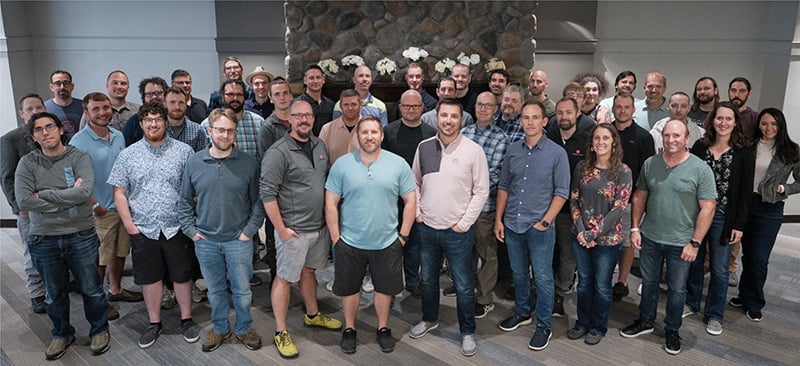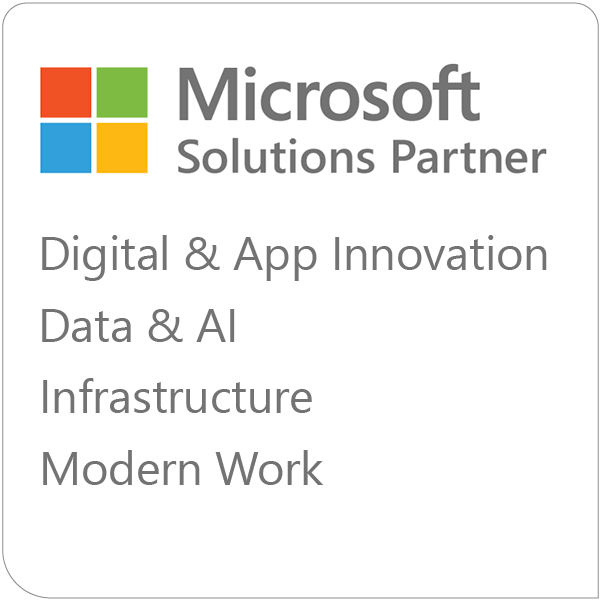In This Blog
When enterprise organizations come to us, efficiency is almost always near the top of their priority list. It’s a common misconception that large companies must already have highly streamlined operations. In reality, many are dealing with years of accumulated tech debt, outdated tools, and internal silos that prevent teams from working effectively.
I’m Zack Wilkins, a Senior Software Engineer at Emergent Software. With more than a decade of custom software development under my belt, I work with enterprise clients who feel their existing tools are holding them back, and together, we find custom solutions.
This blog covers why enterprises outgrow their existing tools, how to recognize when it’s time for a custom solution, what to look for in the right partner, and what a successful process should include. We’ll also explore practical tips on integration, long-term support, and the broader opportunities custom software can create.
Benefits of Custom Software
Custom software offers several important advantages for enterprise organizations. We’ll dive into each of these, but here’s a quick list:
-
It fits your unique business processes.
-
It grows and adapts as your company evolves, reducing the need for manual workarounds.
-
It brings your data together in one place, making reporting and decision-making faster and more accurate.
-
While the upfront cost may be higher, it often saves money over time by avoiding hidden fees and limitations common with off-the-shelf tools.
-
You get full control over how your system works and can prioritize features that support your business goals.
-
With the right partner, you get long-term support to scale with you as your needs evolve.
Why Enterprises Outgrow Existing Tools
Off-the-shelf software and low-code platforms often do a good job at the beginning. They help companies move quickly and solve immediate needs. But as the business grows, so do the edge cases, data complexity, and integration requirements. These tools usually weren’t designed to scale in a way that fits the specific workflows of a maturing organization.
Signs You Might Need Custom Software
If your enterprise is experiencing any of the following, it might be time to consider a custom solution:
-
Teams are using manual workarounds to fill gaps in existing systems
-
Data is spread across too many disconnected tools or spreadsheets
-
Workflows vary wildly from team to team with no clear standard
-
Decision-making is slowed down by lack of visibility or outdated reporting
-
Key systems don’t integrate and require duplicate entry
-
You’ve tried customizing off-the-shelf tools but hit technical or licensing limits
-
Internal teams don’t have capacity or the right skill sets to tackle the problem
What to Look for in a Custom Software Partner
Choosing the right partner is just as important as building the right solution. Here are a few things to consider:
-
Experience with enterprise-scale systems: Look for a team that has dealt with systems of similar complexity.
-
Transparent communication: You want a partner who will tell you what’s working, what’s not, and why.
-
Collaborative approach: Custom software works best when the partner works with you.
-
Strong discovery and planning: The project should start with understanding your business.
-
Ongoing support options: Make sure they offer post-launch support that fits your business continuity needs.
The Custom Software Process
A good custom software process should be designed to reduce risk and increase alignment. Here’s what that typically includes:
-
Discovery: Mapping current workflows, identifying pain points, and aligning on goals
-
Technical architecture: Planning how systems will communicate and where data will live
-
Development: Building iteratively in short sprints, with frequent demos
-
Validation: Testing with real data and users before going live
-
Support: Staying engaged for troubleshooting, updates, and enhancements
Integration
One of the fastest ways custom software can deliver value is through smart integrations. In enterprise environments, data often lives in a patchwork of systems: ERP platforms, CRMs, accounting tools, inventory systems, and internal databases. When those systems don’t communicate well, it leads to redundant work, data inconsistencies, and slow decision-making.
Custom software can act as a bridge between tools, connecting everything from NetSuite and Salesforce to legacy platforms that no longer receive updates. By automating data flows, you eliminate manual entry and reduce the risk of errors. Teams get faster access to reliable information, and your leadership gains a clearer view of what’s happening across the business.
We've helped clients unlock significant time savings and accuracy improvements simply by integrating with the systems they already use. In many cases, we don’t even need to change the user experience, just improve what’s happening behind the scenes.
When evaluating custom software options, make sure integration isn’t an afterthought. Ask how your partner plans to connect your systems, whether they'll use APIs, direct database access, or third-party connectors. A good integration strategy is the foundation for long-term scalability.
Support
Support can’t be an afterthought. Too often, enterprises are left with a piece of software and no clear path forward when issues arise.
Ongoing support should include:
-
Monitoring and performance tuning
-
Bug fixes and updates
-
Enhancements as the business evolves
-
Access to the same team that built the system
If you’re evaluating vendors, ask what their support model looks like. Who picks up the phone when something breaks? How fast can they act?
How Emergent Can Help
If your team is starting to feel the limits of your current systems, or you're unsure how to move forward with a custom solution, we can help.
At Emergent Software, we specialize in building custom applications for complex organizations. Our team brings deep technical expertise, a collaborative approach, and a commitment to long-term partnership. Whether you're looking to integrate systems, modernize internal tools, or build something entirely new, we’re ready to work with you to find the right solution.
Contact us to start the conversation. We’ll help you assess your needs, explore your options, and chart a practical path forward.
FAQ
How do I know if custom software is the right move for my organization?
If your team is constantly working around your current systems, struggling to get reliable data, or juggling disconnected tools, it might be time to consider custom software. The tipping point usually comes when inefficiencies start affecting decision-making, customer experience, or your ability to scale. Custom software gives you the chance to fix gaps in a way that fits how your business actually operates.
Isn’t custom software more expensive than off-the-shelf solutions?
It can be more expensive up front, but the long-term return on investment is often much higher. Off-the-shelf tools typically come with ongoing licensing fees, limited flexibility, and extra work to make them fit your business. Those hidden costs tend to add up over time, especially if you're stuck in a system that doesn’t adapt to your changing needs. With custom software, you're investing in something built to streamline your operations, automate repetitive tasks, and eliminate inefficiencies. That kind of control and scalability is hard to find in a generic tool.
How long does it take to build a custom solution?
The timeline varies depending on how complex the solution is, how much planning has already been done, and how many systems need to be integrated. Most enterprise projects take several months, but breaking the work into smaller phases with clear milestones helps keep things moving forward. A good partner will spend time up front doing discovery and planning, which makes the development process smoother and faster in the long run. You’ll start to see working pieces early, not just a finished product months down the line. That visibility helps build confidence and reduce surprises.
What if our internal team doesn’t have the time or technical skills to support a new system?
That’s exactly the situation many enterprise clients find themselves in when they reach out. Internal teams are often stretched thin or focused on maintaining legacy systems, and they don’t always have the capacity or expertise to take on something new. A good software partner brings in the people and process to guide your team, fill in the technical gaps, and move the project forward without adding to your team’s workload. After launch, the right partner stays involved to keep things running smoothly and make improvements over time.
Can custom software work with the tools we already use?
Yes, and in most cases, integration is one of the biggest benefits of going custom. Whether it’s connecting with NetSuite, Salesforce, legacy ERPs, or internal data warehouses, a custom solution can be built to speak directly to your existing systems. That means less manual work, more reliable data, and smoother workflows across teams. Integration lets you build on what already works while solving what doesn’t. It’s often one of the fastest ways to get value from a custom build.
What does support look like after the project is finished?
Support should be a built-in part of the engagement, not something you scramble to figure out later. At a minimum, that means regular monitoring, bug fixes, performance tuning, and access to the same team that built your software. But great support also includes enhancements as your business evolves, system updates to stay compatible with new tools, and a clear process for responding when something unexpected happens. You want to know who to call, how fast they can act, and whether they understand your system well enough to fix things quickly. Long-term software success depends on having that continuity in place.
Do we need to have everything figured out before starting a custom project?
Not at all. In fact, most enterprise teams come in with a mix of known problems and unanswered questions. A well-run discovery process will help clarify your goals, uncover the root causes of inefficiencies, and shape a plan that makes sense for your business. You don’t need to know what the solution looks like, you just need to know where things are falling short today. From there, a good partner will work with you to prioritize, validate ideas with users, and build something that grows with your organization. It’s a collaborative process from the start.





